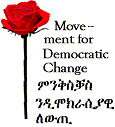|
afrol News, 8 November - As Africa's youngest state turns more repressive and produces an ever-increasing amount of political refugees, opposition to the Asmara-regime is organising abroad. Exiled Eritrean intellectuals have found their platform in the Movement for Democratic Change (MDC), which does not rule out military actions. The recently founded MDC in a meeting yesterday adopted its political platform. The new group had been founded out of the members' "own rough experiences of injustices, humiliation and poverty" in Eritrea and was to challenge the Asmara government on democratic practice, according to the Swedish MDC member and European Representative, Mussie Ephrem. Mr Ephrem told afrol News the recently started MDC already is a forceful movement of "some 500 members in Europe, Africa, the US and Australia." The majority of the founders are "the ex-students of Asmara University and other Eritrean academies," which have found leadership in the ex-President of the Asmara University Students' Union, Semere Kesete. Mr Kesete was a political prisoner until 28 July this year, when he escaped prison and fled to Ethiopia. The new political group today presented its "objectives" in a statement heavily criticising "the ruthless and totalitarian PFDJ regime" of the ruling party. Like other opposition groups, the MDC claims the PFDJ was ruining the fruits of the successful liberation war and now had made Eritrea into a regional "trouble maker country" that "is despised and isolated by the international community for its arrogance and human rights abuse." The MDC's policy paper states that the founders had "decided to stand up and defend our people's rights and thereby challenge politically, and if absolutely necessary even militarily the PFDJ installed system." At this juncture the country's situation was demanding "the unity of all forces and a new dimension of fighting which involves the new generation in the struggle. This will ensure the continuity of our revolution," the exiled Eritreans state.
Mr Ephrem, who himself works with the pacifist Swedish Left Party, however informs us that "the modalities that will be used to achieve the goals decided on will be looked at by the congress," that was to take place in April next year. The MDC was also cooperating with other opposition movements and was to coordinate its efforts with them "install democracy and freedom." According to Mr Ephrem, the MDC was already cooperating with the Eritrean People's Liberation Front-Democratic Party (EPLF-DP), a group founded in Ethiopia in January this year. EPLF-DP has its leadership abroad but claims to have its "main base is inside our country." The Eritrean government however has dismissed the EPLF-DP as "nothing more than a talking shop." The MDC is seeking to become something more than a "talking shop" and aims at cooperating closely with all oppositional groups. The new party however has set its clear political guidelines apart from the overthrowing of the current Asmara regime. Already the rose in the new group's logo indicates it belongs to the political left. Also the programme places great emphasis on social injustice and "economic rights". The democracy envisioned by the MDC is a "parliamentary democracy" with liberal, secular and equalitarian principles. Not exaggerating socialist views, in economic policy the MDC however advocated "sustainable economic development which encourages private investment and mixed economy with predominant free market." Meanwhile, the Eritrean opposition, which in practical terms is confined to work from abroad, is split up in a large number of groups and parties. Many are concentrated in Ethiopia, although the traditional state of hostility between this regional power and Eritrea decreases their credibility in the eyes of many patriotic Eritreans. A growing number of oppositional groups is also headquartered in neighbouring Sudan and are encouraged by the Islamist regime in Khartoum, which claims Asmara is supporting the southern SPLA rebels. The Sudan-based groups include one of the Eritrean opposition's largest organisations; Eritrea's National Alliance, which includes 13 opposition groups. As the Asmara regime has become more repressive, the number of exiled
opposition groups has grown. Although seemingly split, the groups however
are united in the aim of toppling the regime of President Issayas
Afewerki. Almost none of them rule out militarily means, and some of them
may even be able to count on hidden support from increasingly hostile
neighbour states. Sources: afrol News and
afrol archives
|
front page
| news
| countries
| archive
| currencies
| news alerts login
| about afrol News
| contact
| advertise
| español
©
afrol News.
Reproducing or buying afrol News' articles.
You can contact us at mail@afrol.com

